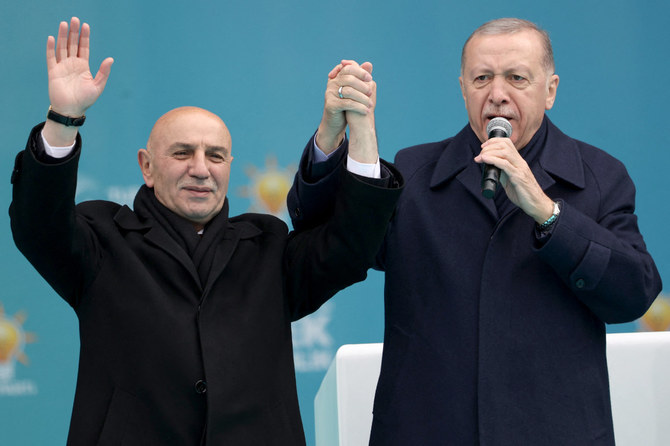ISTANBUL: Turks will vote next Sunday in local elections as President Recep Tayyip Erdogan, buoyed by a strong showing in last year’s general elections, sets his sights on winning back Istanbul.
The secular opposition Republican People’s Party (CHP) seized back control of the city — Turkiye’s economic powerhouse — for the first time since before Erdogan ruled it as mayor in the 1990s in watershed 2019 polls.
That vote also saw the opposition win back the capital Ankara and keep power in the crucial Aegean port city of Izmir, shattering Erdogan’s image of political invincibility.
Erdogan has entrusted his former environment minister Murat Kurum to run for mayor of Istanbul in the March 31 polls as he looks to avenge the worst political defeat of his two-decade rule when CHP archrival Ekrem Imamoglu took the town hall.
The powerful president bounced back last year to win a tough presidential election that came in the throes of an economic crisis and a massive earthquake that claimed more than 53,000 lives in Turkiye.
Now, Erdogan has set his sights on winning back Istanbul — the city where he grew up and where he launched his political career as mayor in 1994.
Imamoglu edged out an Erdogan ally in a 2019 election that gained international headlines for being controversially annulled.
He won a re-run vote by a massive margin that turned him into an instant hero for the opposition and a formidable foe for Erdogan.
The 52-year-old is widely seen as the opposition’s best bet at winning back the presidency from Erdogan’s AKP party in 2028.
“Imamoglu is an effective political operator and at this point in time represents one of the very few glimmers of hope for constituents who oppose Erdogan and the AKP,” Anthony Skinner, director of research at geopolitical advisory firm Marlow Global, told AFP.
But last year’s poor general election showing fractured the opposition and prompted the pro-Kurdish DEM Party — the third largest in parliament — to submit its own candidates in the local polls.
This could cost the opposition.
“The underperformance of the political opposition at the May 2023 elections demonstrated its failure to effectively challenge the political status quo, and, by extension the resilience and resourcefulness of Erdogan,” Skinner said.
In 2019, CHP’s Imamoglu received support from a wide range of political parties that included the right-wing IYI, Kurds and Socialists who oppose Erdogan.
But the lack of unity this time will likely cost Imamoglu several percentage points.
Erdogan is leading the AKP campaign and his rallies are broadcast daily on television, whereas the opposition candidates are given little airtime.
They use social media instead.
The Erdogan government’s failure to get soaring inflation of 67 percent under control could hurt his Kurum’s chances.
Erdogan is due to hold a major rally in Istanbul on Sunday, hoping to unite supporters behind Kurum.
Berk Esen, an associate professor at Istanbul’s Sabanci University, portrayed Istanbul as “the biggest prize in Turkish politics” and said winning back the city was extremely important for Erdogan, 70, who said the March local elections would be his last.
“Obviously, this is his city,” Esen said. “But it goes beyond that.”
“Istanbul is a city with enormous municipal resources that provides services to 16 million citizens,” he said.
Polls suggest it will be a close-run affair.
But Erman Bakirci from Konda polling company insisted that “Imamoglu is ahead” in Istanbul and suggested there could be “a gap between the polls and the actual election results.”
Osman Nuri Kabaktepe, AKP’s Istanbul head, told AFP that Istanbul was crucial because it is “our gateway to the world,” comparing it to the importance of New York and Berlin.
In the capital Ankara, CHP mayor Mansur Yavas appears to be ahead but “a very tight race” could play out, political communications expert Eren Aksoyoglu said, adding that AKP’s nationalist allies are “putting all their weight into the battle.”
Observers say the DEM Party — accused by authorities of links with outlawed Kurdish militants — will sweep large towns in the Kurdish majority southeast including Diyarbakir.
But Aksoyoglu said that some voters may be disillusioned with the political system after 52 mayors in the southeast elected in 2019 on the HDP (now DEM) ticket were replaced by state-appointed administrators.
rba-bg-fo/bc
























